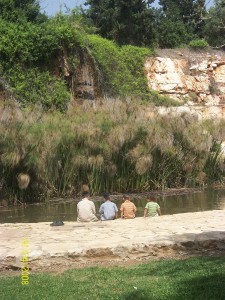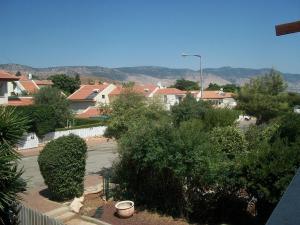This morning dd16 and I left the house together (with Yirmiyahu) early so we could catch the 6 am bus to Jerusalem.
The cause for our trip together was an interview for a seminary (located in Europe) that she is considering for the coming year. I didn’t come along for lack of things to do at home, but because I was told that I also needed to be there. I was wondering if they wanted to check me out to see what kind of mother the girl had? But I was wrong, and the entire interview was so interesting that I have to share with you about it.
The interview began with dd being asked what she had heard about the school. She was then asked if she had heard that they don’t like taking Israeli girls, and why she thinks that is? The interviewer then said that although dd isn’t the typical Israeli applicant, they have to classify her somewhere so they’re considering her Israeli, and as such it was important for her to understand the concerns regarding accepting Israeli girls. You’ll understand that when I heard all of the below that I wasn’t happy that they were considering her an Israeli applicant, particularly as the typical concerns are very much not an issue for her, because it framed her in a certain way before we even began.
Charedi girls from Israel generally are coming from the strongest religious backgrounds of all of their applicants, with very detailed guidelines that they’ve grown up with regarding all aspects of their behavior. Schools are known for their takanons – school rules – they generally cover every aspect of their dress and activity. As she said, if any girl does anything outside of this framework, it will take two hours – she then amended and said, maybe 24 hours – until everyone knows about it and it will affect all aspects of her future negatively. So girls understand that they have to be very cautious about how they dress, speak, with whom they interact, etc.
This has a number of ramifications. One is that girls won’t ask questions about philosophical questions regarding Judaism, because to ask would mean they would be labeled negatively. The main issue that she discussed at length with us is something else. Since they’ve had so much of their lives mandated by school and community rules, they have gone through life doing what is expected because that’s what they have to do. They haven’t developed an internal desire to make good choices because they want to. So why is this so problematic?
Once they leave the typical educational framework in Israel in which so much about their lives is mandated, they don’t handle freedom well. At this seminary, they are very particular about the modesty standards of dress, though their general approach is to let girls grow spiritually at their own rate. Students are accepted from a wide variety of backgrounds, and some girls come from communities with significantly more relaxed standards than others. The main concern of the administration is that the students are growing spiritually, and they’ve found the Israeli girls tend to move down religiously. The Israeli girls think that because others are doing something, it’s okay for them, despite the fact that other girls are making certain choices – in dress, for example – not as an act of rebellion, but because they’ve never learned any differently.
The students are given a lot of trust and freedom with their time; no one asks them where they’re going during free time or comments on how long they were gone. It’s assumed that they have the maturity to manage their time appropriately and well. This becomes a problem when they accept students who have never had this kind of freedom, who can become heady and even reckless in their choices. She gave a number of examples and descriptions of the issues they’ve encountered, to explain why they are reluctant to accept Israeli girls. This is why she wants mothers to be there for the interview – she wants them to understand the serious concerns for these girls, and the mothers need to be actively involved in the discussion about if/how their daughters will handle the more open and accepting environment.
Why did I find this so fascinating? Because I agreed with every single thing she said from a philosophical and practical perspective. For a very long time I’ve talked about the dangers of being overly restrictive when raising children (not only religiously, but academically), that there’s a very real concern that their intrinsic motivation and desire for growth is being erased. They become more worried about externals than internals, because that’s what they see so much focus on. This has been a big factor behind the school choices we’ve made for our children – we’ve avoided schools with extreme and detailed rules regarding every aspect of behavior during school and outside of school hours, not because we are unable to conform, but because we feel it’s damaging to have that degree of micromanagement of individuals and families.
I asked the interviewer what happens to these girls if they stay in Israel for seminary. She said they do fine, because they continue to be in a controlled environment. I pointed out that they may not be doing so fine internally, that they may be going through the motions of living a religious life without a lot of commitment or enthusiasm. She agreed, and said there are definitely issues in raising children in this way.
Dd also found the entire discussion very interesting, and afterward told me that the examples that were given were very accurate of the kind of attitudes and comments that she hears on a daily basis among classmates. Assuming she’s accepted, we don’t know if she will attend this school or not, but if she doesn’t, it won’t be because she can’t handle the responsibility of freedom or because of a struggle to make good choices when others aren’t telling her what to do. She’s grown up with a high level of personal responsibility and has had many opportunities to exercise that.
By the way, dd’s homeschool past came up in conversation when she was asked where she attended school prior to moving to Israel. At the end of the interview, I was told that we’ve done a great job with her and homeschooling was obviously a big part of the wonderful person she is. It was a nice surprise to hear someone so positive about homeschooling! I did have to correct her, though, and told her that who dd is, is because of her efforts, not mine.
Avivah








